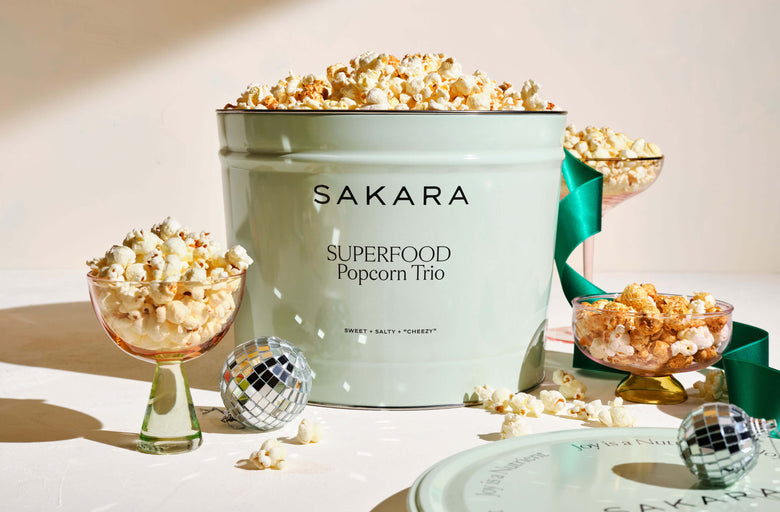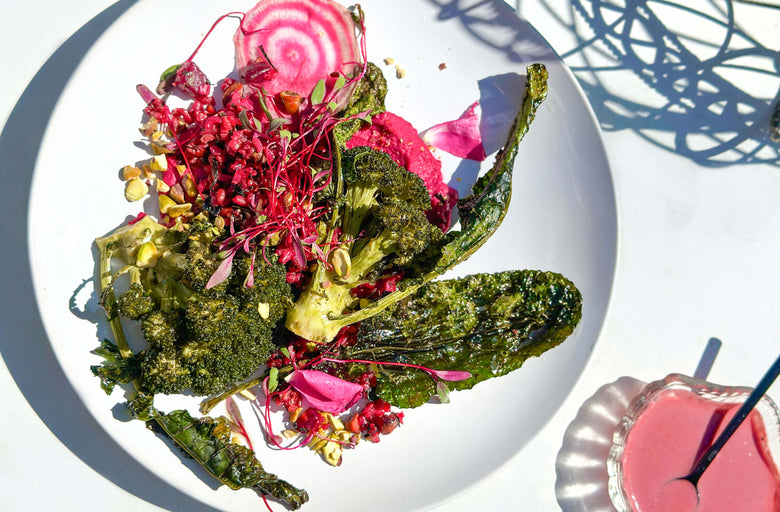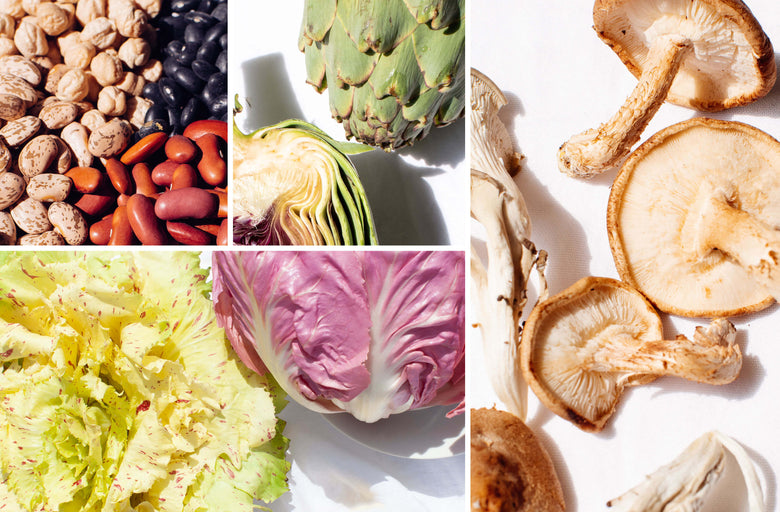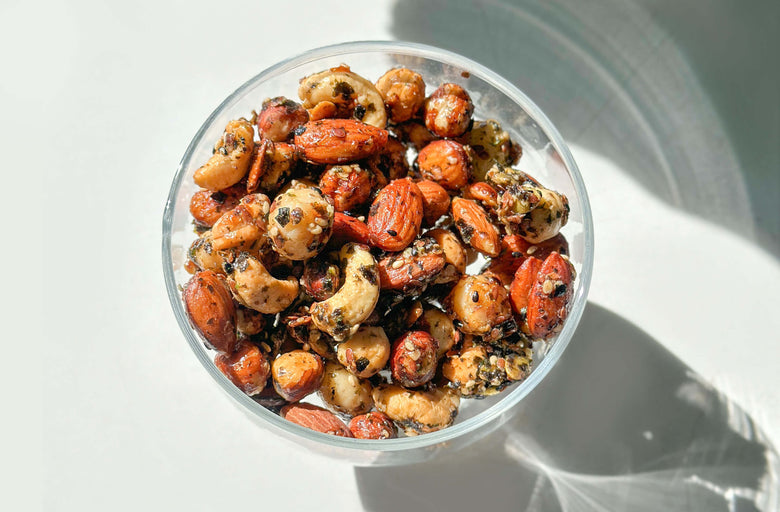“Oh, just this once,” we tell ourselves as we opt for fast-casual en route home from the office, grab a sugary, creamy pint from the freezer, and top it off with a tall pour of Pinot noir. Stressful moments and mental lows call for extra feel-good factors, right?
Well, yes. But not in the way you may be thinking. Our mental health is inextricably tied to our gut health—meaning for a true (and self-renewing) uptick in mood, your toolkit should include nourishing plant-rich foods.
Plant-powered nutrition isn’t just a cure for one-off moments of amplified stress; it may even help reduce the symptoms of a wide range of psychological and cognitive health issues, including ADHD, anxiety, depression, and OCD.
“Until we solve nutritional problems, no amount of medication and psychotherapy is going to be able to stem the tide of mental issues in our society,” says Dr. Uma Naidoo, a board-certified Harvard trained psychiatrist, professional chef, and nutrition specialist.
We sat down with Dr. Naidoo—who’s not only a triple threat in food-as-medicine, but also a beloved Sakara Science Council member and best-selling author—to discuss the important relationship between food and mental health.
The Gut-Brain Romance
“Did you know that the same embryonic cells that form our brain and nerve cells also form the nerves of the GI tract?” asks Dr. Naidoo. “By way of the vagus nerve—which modulates our rest-and-digest response—our gut and brain are intimately connected in an efficient, two-way means of communication.”
The vagus nerve—the “superhighway” of bidirectional communication and the longest of all the cranial nerves—lives within the parasympathetic nervous system, which oversees mood, immune response, digestion, and heart rate. It’s a relationship commonly referred to as the gut-brain axis, or as Dr. Naidoo calls it, “the gut-brain romance.”
How does this play out? Think of the 38 trillion organisms (bacteria, fungi, archaea, viruses, protozoa) residing in your gut microbiome as little bugs tasked with upkeeping your wellbeing. When you eat plant-rich foods, the bugs are happy, responding by creating short-chain fatty acids and butyrates (a kind of short-chain fatty acid that’s important for digestive and brain health). They are transmitted back and forth between the gut and brain, promoting a healthier brain, body, and gut.
Now, let’s say you subsist off of fast food or foods with lots of processed vegetable oils. The dynamic, interactive process between your gut and brain may not immediately place a cloud over your head but, with time, the toxic byproducts of digesting these foods can cause inflammation in your gut. Inflammation in the brain quickly follows.
“If you’re just sort of feeling off in a consistent way or having some unusual thoughts, ask yourself what you ate in the last 24 or 48 hours, and see if there's any pattern associated with it,” says Dr. Naidoo. “I've had individuals who make a change to their diet and they don't realize it. (Of course, if someone has pre-existing medical conditions, they should make sure they're taking their medications for that, too.)”
A diverse, nourishing, fiber-rich array of plant foods not only gives your gut bugs the foods they thrive on, but also gives you something to smile about. Ninety percent or more of serotonin (the happy hormone) receptors are in the gut, as is 90% of serotonin production. Radiant health and ultimate happiness is within you.
Eat to Empower Yourself
If you’ve been “treating yourself” to foods that feel good in the moment, but leave you in a mental cloud later: fear not. Shifting your diet toward more vibrant, nutritious foods has an almost immediate effect on the health of your microbiome. “Realize that the foods you eat start to impact those bacteria and the microbes [in your gut] within two hours. The more you’re really eating nutritious foods—like fiber-rich vegetables, fruit, beans, nuts, seeds, legumes—that's feeding the microbiome. You are nurturing those microbes. You are taking care of yourself. You're taking care of your brain and your body,” says Dr. Naidoo.
When it comes to diagnosed mental health conditions—amidst a longer-term holistic approach of therapy, joyful movement, mindfulness, and/or medication—Dr. Naidoo encourages her patients to bring on their practitioner, doctor, or whoever they are working with as an ally in the process, working with them to incorporate nutrition to assist—and ultimately put them in the driver’s seat of their own health.
Dr. Naidoo’s favorite foods for mental health?
Greens: With mental health in mind, getting your greens is a great place to start. They are high in fiber, which is associated with improving depression and anxiety symptoms, and nourishing the gut microbiome. They also contain folate, iron, and zinc—all necessary in the biochemical process of making mood-modulating neurotransmitters, like serotonin and dopamine.
Berries: Juicy, brightly-hued berries are full of powerful antioxidants (like anthocyanin compounds) and phyto-nutrients that help boost serotonin in the brain to improve mood. And, if you need another reason to drop a handful into your granola, berries also contain anti-inflammatory properties that promote healthy brain aging and cognition.
Spices: Help shut down anxiety with spices. In particular, there’s a good amount of evidence that adding a duo of turmeric and black pepper to dishes can help reduce anxiety. (Plus, spices in general are powerful nutrient-dense and flavorful additions to meals, ones that help with sustaining healthy changes.)
Omega-3s: Reduce anxiety with an algae oil supplement (P.S. there’s one in The Foundation), or add a plant-based source of short-chain omega-3s to your diet, like chia seeds, walnuts, or flaxseeds. Good fats are your friend.
(Hungry for more? Listen to Dr. Naidoo discuss the connection between your brain and your plate on The Sakara Life Podcast or read her best-selling book.)






